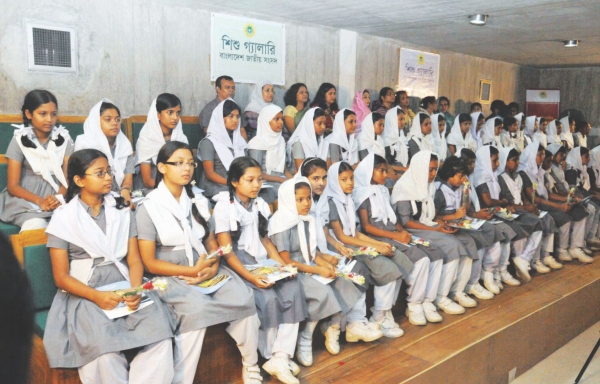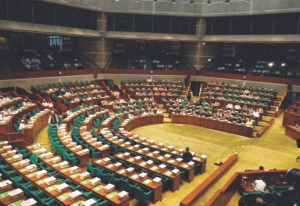| Home - Back Issues - The Team - Contact Us |
 |
| Volume 11 |Issue 36| September 14, 2012 | |
|
|
Endeavour
Parliament Sessions for Children Children are not only allowed to be present during the parliamentary sessions from now on, but they will be taken on a guided tour through the magnificent building of the national parliament. Akram Hosen The parliamentary sessions in our country often end up in a tirade of abuse by lawmakers. But from now on, while engaging in the cutthroat debates, the MPs should keep in mind the presence of children below the age of 12 in the parliament chamber and mind their language, warned the speaker. One can never tell if the presence of children at the parliament chamber will finally bring an end to indecent hurling of abuse during the sessions, but during the last two sessions, it was that evident that the children were having a blast at the gallery recently modified to accommodate some 50 of them. The students of class five and some of their teachers at Sher-E-Bangla Nagar Government Girls High School were the first group of children below 12 to be present at the parliamentary session. “The building and the lake are spectacular,” say some the little girls in chorus when asked what they thought about the parliamentary session. It seems that it is the 'class outing' that matters most to them. “There is a visitor's section in the Parliament Secretariat. We showed them around the huge building and told them about its specialties,” says Pranab Chakraborty, additional secretary to the Parliament Secretariat and the wing chief of the visitor's section. Anyone can bring his/her children below 12 and watch the sessions. “But we insist that only one of the parents should come, because we don't want the place to be filled up with grownups,” says Pranab.
The children's gallery is located at the opposite of where the speaker sits. The children can see the proceedings clearly. The area is sound proof. So there is no chance of children disrupting the sessions. Other galleries that are reserved for teenagers are not so protected. So the officials at Pranab's department have to brief them to be quiet during the sessions. Before this recent initiative, no one below 12 was allowed in the gallery. “Watching the sessions on TV gives only a partial idea, because what is shown is edited and shows only cut to cut shots,” says Pranab. As a result, people who had never been present during the proceedings of the house don't know what it was like in reality. “For example, when they read from the holy Qu'ran, they usually show the canopy. The ones, who haven't seen the inside of the chamber, do not understand what is being shown,” he adds. It all started with a visit to the Australian Parliament by our speakers and the secretaries in 2010. There is a UNDP supported project named Improving Democracy through Parliamentary Development. Through the initiative of the project, our officials went to visit the Aussie parliament and its library. There, they saw children engaging in mock parliamentary sessions. “The honourable speaker liked the practice. But their building is particularly designed to leave a lot of room for children,” says Pranab. In the absence of those facilities, a gallery facing the speaker was prepared for the kids. The prime minister sits on their left and the opposition on their right. The project is hoped to teach children how to use logic as a tool for argument and enhance their analytical skills. The mock parliament for children is also underway. The youth parliament for teenagers has already been arranged. In the first session, they debated about issues related to the environment in the presence of the speaker and the deputy speaker. The next youth parliament will be held by the end of this year. Two officials of the secretariat will be in charge of training them. Although the initial plan was Dhaka based, the secretariat is now planning to make use of the 64 Shishu Academies and bring the best debaters from across the country join the youth parliament. They are planning to train them at the divisional level and then bring them to the centre. “What I'm concerned about right now is logistics,” says Pranab. “Suppose a girl from Patuakhali comes to the capital to be at the parliamentary session. I am sure that she will be coming with a guardian. We'll have to bear their expenses and accommodate them in the capital.” However, the authorities of Sher-E-Bangla Nagar Government Girls High School arranged their own transportation to send the girls to the parliament, informs Rahima Akter, Assistant Head Mistress of the school. “But the effort was worth it. I loved how the girls expressed their excitement and wondered at the magnificence of the building,” she says. The girls are used to seeing the premier, the speaker, and other lawmakers on TV. But in the parliament, they have not only seen them in the flesh but were introduced to and greeted by them. “I didn't understand any of the grownup talks at the session, but I liked the idea of being present there,” says Sabah Asfar, a student of class five. Apart from the experience of being in the magnificent building, there is a symbolic value to it, asserts Rahima, the assistant head mistress. “Through this, they will learn values of egalitarianism. They'll learn how to assert their opinion and at the same time listen to what others have to say,” she says. The teachers and the officials of Parliament Secretariat principles hope that eventually, the democratic values will disseminate in the educational institutions and other institutions through this practice. “When these children will join the student wings of political parties, they will abide by the principles of democracy,” hopes Pranab. Cutthroat debate and agitation of the MPs can be seen in all the parliaments of the world. It's inevitable. But the children are intelligent enough to tell right from the wrong. Besides, the speaker has also asked the MPs to act like role models for the future leaders of the nation. Above all, it is likely that our lawmakers will maintain discretion in the presence of the children.
|
||||
Copyright
(R) thedailystar.net 2012 |

